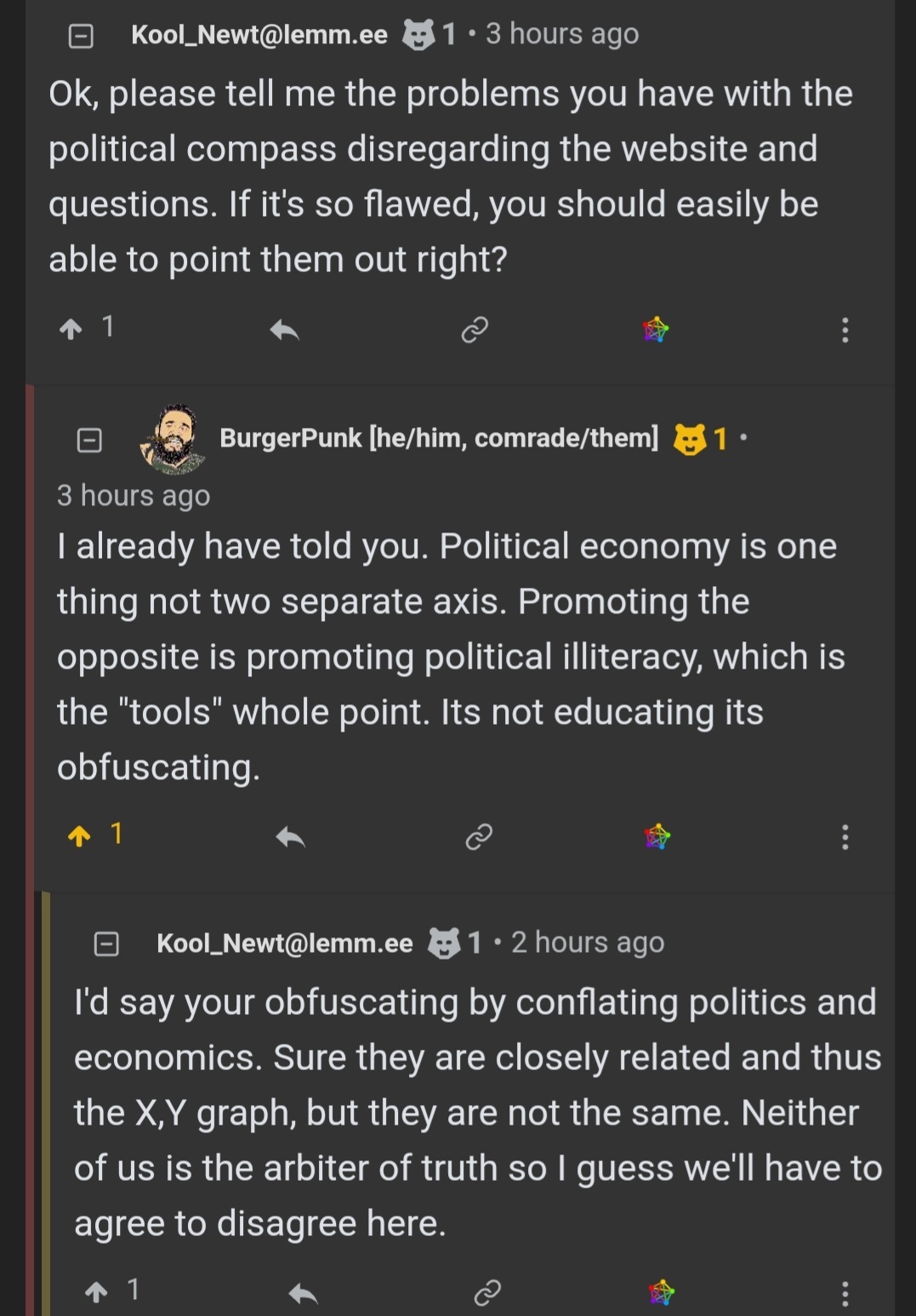view the rest of the comments
the_dunk_tank
It's the dunk tank.
This is where you come to post big-brained hot takes by chuds, libs, or even fellow leftists, and tear them to itty-bitty pieces with precision dunkstrikes.
Rule 1: All posts must include links to the subject matter, and no identifying information should be redacted.
Rule 2: If your source is a reactionary website, please use archive.is instead of linking directly.
Rule 3: No sectarianism.
Rule 4: TERF/SWERFs Not Welcome
Rule 5: No ableism of any kind (that includes stuff like libt*rd)
Rule 6: Do not post fellow hexbears.
Rule 7: Do not individually target other instances' admins or moderators.
Rule 8: The subject of a post cannot be low hanging fruit, that is comments/posts made by a private person that have low amount of upvotes/likes/views. Comments/Posts made on other instances that are accessible from hexbear are an exception to this. Posts that do not meet this requirement can be posted to [email protected]
Rule 9: if you post ironic rage bait im going to make a personal visit to your house to make sure you never make this mistake again

The entire idea of creating a model, with any number of axises more and more abstract, is flawed and idealist. The marxist conception is that there is only one "axis" and it's not a smooth gradient but several distinct classes with different interests. On one side you have the interests of the colonized, the renters, the employees, the lessees, the workers and the poor. On the other side you have the interests of the colonizers, the renters, the employers, the lessors, the owners and the rich. It's not that simple exactly, but that's the starting point before you start chiseling in with additional contours of nuance. Currently in America there is no political party representing the interests of the former group, and there's 2 dominant parties representing factions of the latter groups.
Much of what you think you know of as "politics" is interfactional disputes between the owning class. A lot of what actually determines political economy is disguised and invisible because both groups of ruling elites agree on a subject, so it assumed to be necessary or permanent. Lots of social problems are fabricated to divide the poor or are downstream symptoms of upstream profit generators.
Every additional axis you add makes a model more abstract and disconnected from material interests of groups, more idealist and a priori. One's held political belief also is less important than we like to think, and what actually matters is your lived political existence. It doesn't really matter if you believe in communism or fascism or whatever ism if you never leave your house or do anything to impact reality besides shouting into the void of online. Which class are you part of, and do you want to pursue your self interests selfishly or as an entire class in solidarity?
Good response. Agree. In general. I specially agree with the last paragraph.
But it is also the case that diferent owner clases beneffit from diferent laws and ideology. The common example is the american civil war were feudal aristocrats favored low tariffs while industrial capital prefered protectionist tarifs and wage labor, and a strong state that invested in infraestructure like railroads. Views on ussury in feudal vs trade vs mixed societies is another example.
Similarly labor relations as determined by the means of production influence the ideological positions of a society towards labor.
No society has a single means of production, there is usually an amalgam of economic interests each of this benefits from a different law, ideology or coustom. My line of questioning was in this sense, wether diferent material basis of siciety for example pastoralists vs agriculturalists lead to different ideological spaces, and how much of that is pure idealism and how much correlates to differences in the mode of prodiction.
Good response. Agree. In general. I specially agree with the last paragraph.
But it is also the case that diferent owner clases beneffit from diferent laws and ideology. The common example is the american civil war were feudal aristocrats favored low tariffs while industrial capital prefered protectionist tarifs and wage labor, and a strong state that invested in infraestructure like railroads. Views on ussury in feudal vs trade vs mixed societies is another example.
Similarly labor relations as determined by the means of production influence the ideological positions of a society towards labor.
No society has a single means of production, there is usually an amalgam of economic interests each of this benefits from a different law, ideology or coustom. My line of questioning was in this sense, wether diferent material basis of siciety for example pastoralists vs agriculturalists lead to different ideological spaces, and how much of that is pure idealism and how much correlates to differences in the mode of prodiction.